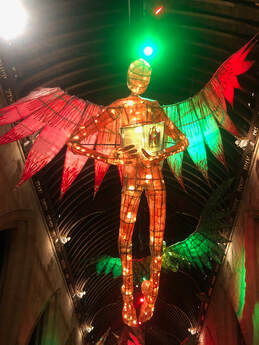
 So, angels are coming. How will we greet them? At once, perhaps we start to ponder: but what are we greeting? And are there such things as angels anyway? Modernity’s functional materialism has so much to answer for! From a Reformed Christian perspective today it is also sometimes hard to engage. For whilst the classic Reformed theologians were quite clear that angels are to be taken very seriously, as they appear in so many places in the Bible. Yet later thinkers have found less value. In some quarters of liberal and progressive Protestantism they almost became erased: rejected with supposedly passé doctrines like the virgin birth, miracles and even major articles of the historic creeds. Ironically, as liberal Protestantism declined, other faith constructions began to thrive, not least New Age spiritualities with their extraordinary mix of angelic and other speculations. Did demythologising thereby open the door to old heresies? - as well as to a loss of divine wonder in the secular world? Certainly, as Les Murray pondered in his poem ‘The Barranong Angel Case’, which we heard read earlier, do we have the capacity to see and receive the angels of Christian tradition today?
0 Comments
 Growing up, even as a little child I was fascinated by what was then known as the English Civil War (although, to be accurate historically, this is now rightly recognised as several different wars across the islands of Britain and Ireland). It was a bitter and brutal period, culminating in the judicial trial and execution of the King. For this was a powerful revolution. Indeed it saw the establishment of a republic, the Commonwealth and Protectorate under Oliver Cromwell. Moreover, in that latter period there was also an extraordinary flowering of truly radical religious and political life and thought. That, I think, was what especially drew me into the study of history. For the origin of many liberal democratic things we take for granted lie there – for example, the insistence on no taxation or legislation without representation, on regular elections, fixed parliamentary terms, equal votes, and, vitally, on religious freedom for different types of groups, particularly the marginalised. Indeed, Cromwell even reopened England to the Jews, who had been banned for centuries. For his supporters were also part of the movements which helped create Congregationalism, the original founding tradition of Pitt Street Uniting Church... 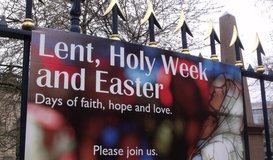 Well we have a real piece of theatre in our Gospel reading today, don't we? It's beautifully set up. We can picture it clearly. Jesus in shining robes or simple sackcloth. The devil, however we want to picture him - or her- horn and tails, or sharp cut suit and red high heels. Good on one side, evil on the other and after a bit of verbal swordplay good comes out victorious. It's how we'd all love it to be. It is the subtext of every superhero book or movie. Yet it is not real life is it? It is not the world in which we struggle to pay our bills, and sit up late to meet someone else's deadlines and get cranky with our kids and shout at the dog. In our real world good and evil are all mixed up. We know the good thing that we want to do for our own good and that of others and we do the opposite for no reason we can fathom, as Paul said. In this real world we are four days into Lent and many of our good intentions, I'll take a bet have already evaporated or never been begun. (Never mind pick yourself up and have another go!) But what use is this story to us, mere humans?... 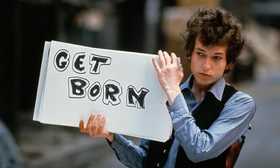 The first Christmas sermon I preached here in Toowoomba empolyed words of a great poet songwriter singer: Leonard Cohen who, sadly for us, died recently. Let me then preach my final Christmas sermon here with reference to the words of another great poetic songwriter singer: Bob Dylan, who was recently awarded a Nobel Prize in Literature. For like Leonard Cohen, Dylan’s lyrics have typically been grounded in a relationship to existence which we can call religious, in the very best sense of that word: namely a relationship which is not always conventional, and certainly not ‘churchy’, but which is always seeking to connect with the deepest ground of our being. It is from this place that we find our truest meaning, both for our individual lives and for our families, communities and wider world. For, in Dylan’s words which take us to the heart of the feast of Christ’s nativity, whoever ‘is not busy being born is busy dying.’ In the nativity we see the ultimate meaning, source and purpose of life. We are invited to share that light and love, by allowing it to be born more fully in us and the world around us… Jesus has come to his hometown. And of course everyone wants to see him and to hear their local hero speak. Next week we will hear how what he had to say next got him into trouble. But today we hear how he announces himself with words that must have been music to their ears - indeed the very next verse reads, 'and all spoke well of him'.
Jesus reads the words of Isaiah and takes them as his own mission statement - 'today this scripture has been fulfilled in your hearing " he says. It is a scripture that talks about good news for the poor, release to the captive, sight for the blind, and freedom for the oppressed.' Now most of his listeners would have counted themselves among the poor and oppressed, so no wonder they were pleased... What does a saint look like? One of the saints I have known was a wonderful Geordie lady called Ellen King. There were many ways in which she loved God and her neighbours. Almost every day this included her hard work in the baker’s shop she shared with her sisters. The shop and bakery was on the old Sunderland Road in Gateshead, close by the river Tyne, and it was always a busy place. For local people it was also a source of both physical and spiritual sustenance. Almost all who came to the shop were poor or struggling in various ways. Always they had a wonderful warm welcome from Ellen. Indeed children, and those particularly desperate, usually received an extra something tasty. Everyone enjoyed gorgeous homemade bread, full of joy and yumminess.
I still think of Ellen’s bakery as a model of what church is at its best: a place of faith and hope, offering sustenance for life’s journey, physical and spiritual, with love and eternal joy sharing suffering and surprising gifts with anyone and everyone who passes through. Not for nothing perhaps is the baker woman an image of God in Godself. Both Matthew (chapter 13 verse 33, and Luke 13, verses 20-21) share this resonant metaphor of God’s work in and through us. It is reflected in so much that is good in Christian living, not least in the baking of bread, literally and metaphorically, in our homes and churches, in the many gatherings, meals, and times of hospitality we share together, and, vitally, with others. As we reflect again, today, on the theme of Jesus Christ as the Bread of Life, let us therefore give thanks for the presence of the baker woman God among us, in one another and in the hospitality we share with others… 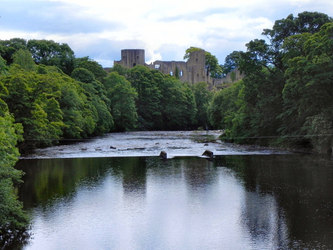 Jon Inkpin for River Sunday, 28 September 2014 What is the name of your river? This is among the first questions Maori in Aotearoa New Zealand will ask anyone they meet. For mihi – greeting and introduction – is very important in Maori culture and establishing relationship requires that people know where each otber comes from and what has shaped them. So what is the name of your river? Maybe, like me, several rivers have shaped you. However most, if not all of us, I suspect, have been shaped by one or more particular river. For, even in our modern world, rivers are fundamental to human existence and community... 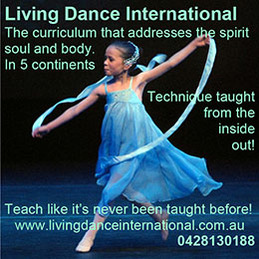 for Pentecost 4, Aboriginal & Torres Strait Islander Sunday, 13 July 2014 by Jon Inkpin Are you a dancer? Do you ever go to a dance group, or watch dance? Have you ever been a dancer? – I don’t mean professionally, or even as a hobby, just: have you ever danced? You know, I reckon all of us have danced, at least once, and more than once, even if we have forgotten, or chosen to forget, about it. Think about it: all little children dance. Put on a piece of music, or just watch a little child moving about: he or she is full of natural dance and movement. For dancing is a very natural part of what it is to be human. Indeed, it is a natural, and even integral, part of what it is to be alive. For the whole creation is really, actually, a dance: a dance of all the elements of creation; in, and with, the glory of our dancing God. I hope that doesn’t seem like a shocking affirmation. If it does, then blame Jesus in our Gospel reading today. What is he saying? – why: let go of your burdens and dance with me. So, will we dance?... 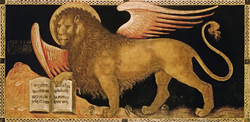 for St Mark’s Day, 27 April 2014 , by Jonathan Inkpin Of what are you afraid? All of us are afraid, of something, in some ways, at some points in our lives. It is all part of being human. Even Jesus, in the garden of Gethsemane, appears to have wrestled with his own fears, as he waited to be arrested, tried, and cruelly killed. Yet, as Jesus above all showed us, perfect love casts out fear (I John 4.18). The Resurrection is the greatest proclamation of this reality. For all fears are taken up in the cross of Jesus. All fears are transformed by the perfect love of God shown to us. And all fears are declared void by the power of the Resurrection offered to us. Will we grasp this however? Our Gospel reading today is the Resurrection story according to St. Mark (chapter 16, verses 1-8). It is an extraordinary ending to Mark’s Gospel, for it doesn’t really end at all, properly in literary terms. It just stops, literally, in mid-sentence, and invites us to respond. For we are told that the women at the tomb were both asked by Jesus to share the Gospel and they were grasped by fear. So what is our response? Are we grasped by a similar fear? How will we complete the Gospel which St. Mark gives to us?... 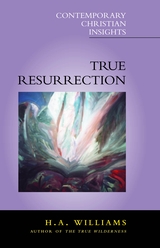 Lent 5A, Sunday 6 April 2014, by Jonathan Inkpin This week I met an interesting woman called Viki Thondley. Among other things, she runs a business in Toowoomba, called Mind, Body, Food. As a holistic therapist, she thereby offers others opportunities to address the stresses of our bodies and lives so that we can all enjoy greater wellbeing. She invites us to look into ourselves and our lifestyles to let go of those things which hurt and to open ourselves to those which heal. In that way, as we understand better the intimate connections between our minds, bodies and food, we can find greater health and confidence. For it is as we better understand who we are, what we think, and what we feel, that we can grow in energy and empowerment. She herself is a good example. For like many great healers, Viki speaks from what she knows. As she has addressed her own self, her past and continuing wounds, so her being and actions speak volumes about the healing path. Now, whilst she has wide understanding of much of the contemplative wisdom traditions of our world, Viki mainly works on the level of the natural. She is thereby accessible to many secular people, and to estranged Christians, who might find our Church’s paths to healing less easy to access. Yet this healing journey is at the heart of our Gospel, not least in the great story we have heard today. For our Gospel story today opens us up to what the 20th century Anglican monk, Father Harry Williams, called ‘true resurrection’... |
Authors
sermons and reflections from Penny Jones & Josephine Inkpin, a same gender married Anglican clergy couple serving with the Uniting Church in Sydney Archives
June 2024
Categories
All
|
 RSS Feed
RSS Feed